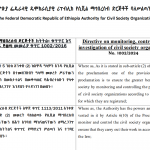Can a taxpayer present evidence to the tax authority after an Audit has started?
Ethiopian tax statutes have not addressed the admissibility of evidence presented to the tax authority (the Ministry of Revenue) once an audit has started. The repealed Financial Bookkeeping Directive No. 152/2019 and the new Directive No. 176/2022 don’t sufficiently cover the admissibility of evidence apart from stating that a taxpayer is required to submit evidence within a certain period upon written request by the tax authority.
On February 7, 2023, the Federal Supreme Court Cassation Bench rendered a decision addressing this issue under file number 232752. The Cassation Bench has provided that procedural matters that are not addressed in relation to the relevance and admissibility of evidence and court litigation procedure will be governed by the regular procedural rules set out by the Civil Procedure Code of Ethiopia.
As stipulated under Article 35(2) of the Financial Bookkeeping Directive No. 152/2019, a taxpayer is required to provide evidence before the audit of the company is completed. In the case at hand, the Tax Appeal Commission disregarded evidence submitted to it after an audit started based on this provision. The Federal High and Supreme Courts, however, decided that such evidence was admissible. The Cassation Bench maintained this decision, stating that the taxpayer can provide evidence as long as the auditing process is not completed.
Therefore, evidence is admissible when provided before the completion of the auditing process, and it should be reviewed by the relevant decision-making body. And the tax authority (the Ministry of Revenue) shall be asked to give an opinion on the matter. The Cassation Bench has provided that there is no legal ground to say a document is not relevant and inadmissible just because it is presented after the auditing process has started.
Disclaimer: The views and opinions expressed do not reflect the official policy or position of DABLO. The writing is not intended to be, and should not be used as, a substitute for taking legal advice in any specific situation.






